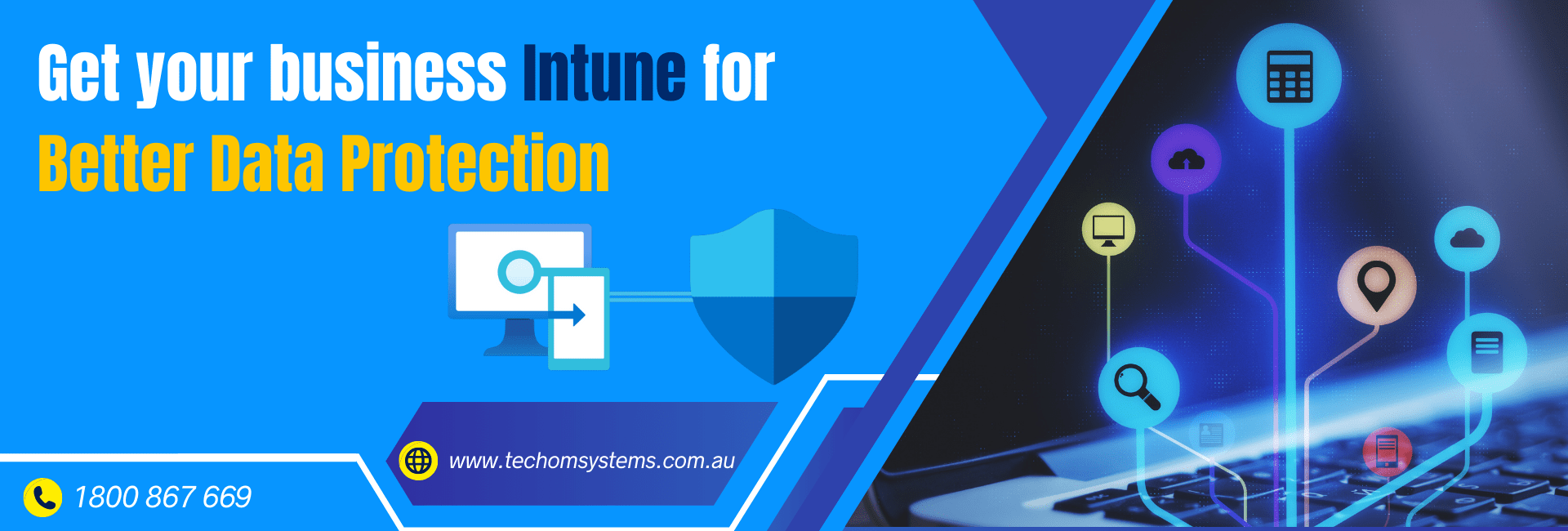Data protection is more critical than ever for businesses of all sizes in the fast-paced modern world. Whether you’re a small startup or a large corporation, safeguarding sensitive information is paramount to maintaining customer trust and avoiding potential threats. That’s where Microsoft Intune comes in. With its strong security features, Intune enables you to manage and protect your company’s devices and data effectively. From securing mobile devices and apps to enforcing policies and controlling access, Intune provides a comprehensive solution to protect your business.
The importance of data protection for businesses
Data protection has become a top priority for businesses in recent years. The increasing reliance on technology and the rise of cyber threats have made it essential for companies to take proactive measures to protect their data. A data breach can have severe consequences, including financial loss, damage to reputation, and legal implications. Therefore, investing in robust data protection solutions is crucial for any business that wants to stay competitive and maintain customer trust.
One of the main reasons why data protection is so important is the sheer volume of data that businesses handle on a daily basis. From customer information to intellectual property, businesses store a vast amount of sensitive data that needs to be protected from unauthorised access. Additionally, businesses need to comply with various industry regulations and data protection laws, such as the General Data Protection Regulation (GDPR) in the European Union. Failure to comply with these regulations can result in significant penalties and reputational damage.
To address these challenges, businesses need a comprehensive data protection strategy covering all operations. This includes implementing secure protocols and technologies to prevent data breaches, training employees on data security best practices, and regularly monitoring and updating security measures to stay ahead of evolving threats. Microsoft Intune offers a powerful solution to help businesses achieve all these goals.
Common risks and vulnerabilities for business data
Before diving into how Microsoft Intune can help protect your business data, let’s first explore some common risks and vulnerabilities businesses face. Understanding these risks is essential for developing an effective data protection strategy.
One of the most significant risks is the increasing sophistication of cyber threats. Hackers and cybercriminals are constantly developing new techniques to bypass security measures and gain unauthorised access to sensitive data. Phishing attacks, malware, ransomware, and social engineering are just a few examples of the methods used by cybercriminals to infiltrate businesses’ systems.
Another common vulnerability is human error. Employees are often the weakest link in the security chain, unintentionally exposing sensitive data by clicking on malicious links or falling victim to social engineering attacks. Without proper training and awareness, employees can inadvertently compromise their organisation’s security.
Third-party risks are also a concern for businesses. Many companies rely on third-party vendors and partners to handle various aspects of their operations, from cloud storage providers to software developers. However, if these third parties do not have adequate security measures in place, they can become a potential entry point for attackers.
These risks highlight the need for a comprehensive data protection solution that addresses both external threats and internal vulnerabilities. Microsoft Intune offers a range of features designed to tackle these challenges head-on.
Understanding Microsoft Intune for data protection
Microsoft Intune is a cloud-based endpoint management solution that allows businesses to manage and protect their devices, applications, and data from a single platform. It offers many features and capabilities that can help enterprises to enhance their data protection efforts.
One of the core functionalities of Intune is mobile device management (MDM). With MDM, businesses can enforce security policies, manage device configurations, and remotely wipe data from lost or stolen devices. This is particularly important in today’s mobile-first world, where employees often use their personal devices for work-related tasks. Businesses can reduce the risk of data breaches and unauthorised access by ensuring that these devices are secure and compliant with company policies.
In addition to MDM, Intune also provides mobile application management (MAM) features. With MAM, businesses can control corporate applications and data access, even on personal devices. This allows for a more granular level of control, ensuring that sensitive information is only accessible to authorised users and protected from unauthorised sharing or copying.
Intune integrates seamlessly with other Microsoft security solutions, such as Microsoft Defender Advanced Threat Protection (ATP) and Azure Active Directory (AAD). This integration enables businesses to leverage the power of these tools to enhance their data protection efforts further. For example, by combining Intune with ATP, businesses can detect and respond to advanced threats in real time, minimising potential breaches’ impact.
Key features and benefits of Microsoft Intune
Now that we better understand what Microsoft Intune is and how it can help protect your business data, let’s explore some of its key features and benefits in more detail.
Device management
Intune allows businesses to manage various devices, including Windows PCs, Macs, iOS devices, and Android devices. This ensures that all devices accessing company resources are secure, compliant, and up-to-date.
Application management
With Intune, businesses can control corporate applications and data access, ensuring that only authorised users can access sensitive information. This helps prevent unauthorised sharing or copying of data, reducing the risk of data breaches.
Conditional access
Intune provides the ability to set up conditional access policies, which allow businesses to control access to company resources based on specific conditions, such as device compliance, location, or user group. This helps ensure that only trusted devices and users can access sensitive information.
Data loss prevention
Intune includes built-in data loss prevention (DLP) policies that help businesses identify and protect sensitive data. These policies can be customised to meet specific business needs, ensuring that critical data is protected from accidental or intentional leaks.
Security baselines
Intune offers predefined security baselines that businesses can use as a starting point for their security configurations. These baselines align with industry best practices and help ensure that devices are configured securely right from the start.
Threat intelligence
Intune leverages Microsoft’s vast threat intelligence network to provide real-time insights into potential threats. This helps businesses stay one step ahead of attackers by proactively identifying and mitigating security risks.
Compliance reporting
Intune provides comprehensive compliance reporting capabilities, allowing businesses to monitor and track the security posture of their devices and applications. This helps businesses comply with industry regulations and internal security policies.
These are just a few examples of the features and benefits that Microsoft Intune offers. By leveraging the power of Intune, businesses can significantly enhance their data protection efforts and reduce the risk of data breaches.
Setting up Microsoft Intune for your business
Now that you understand the key features and benefits of Microsoft Intune let’s discuss how to set it up for your business. Setting up Intune involves several steps, but Microsoft has made the process as straightforward as possible.
Choose your Intune subscription
Microsoft offers several Intune subscription options, including standalone Intune and Microsoft 365 plans that include Intune. Evaluate your business needs and choose the subscription that best fits your requirements.
Set up Intune in the Azure portal
Intune is managed through the Azure portal, so you’ll need to set up an Azure account if you don’t already have one. Once you have an Azure account, you can create an Intune instance and configure the necessary settings.
Define your device and app management policies
Before you can start managing devices and applications with Intune, you’ll need to define your policies. This includes deciding which devices and apps are allowed, setting compliance rules, and configuring security settings.
Enrol devices
Once your policies are in place, you can enrol devices into Intune. This can be done through various methods, depending on the type of device and your business requirements. For example, Windows devices can be enrolled through the Windows Autopilot service, while iOS and Android devices can be enrolled through the Intune Company Portal app.
Test and monitor
After enrolling devices, testing and monitoring the Intune deployment is important to ensure everything is functioning as expected. Monitor compliance, track security events, and address any issues that arise promptly.
Setting up Intune for your business may require some technical expertise, so it’s advisable to consult with an IT professional or partner with a managed services provider specialising in Intune deployments. This ensures the setup process is smooth and tailored to your business needs.
Best practices for data protection with Microsoft Intune
While Microsoft Intune provides powerful tools for data protection, it’s essential to follow best practices to maximise its effectiveness. Here are some tips to help you get the most out of Intune and enhance your data protection efforts:
- Review and update policies: Data protection policies should be regularly reviewed and updated to align with changing business needs and evolving security threats. Conduct periodic assessments to ensure that your policies remain effective and relevant.
- Educate employees on data security: Training employees on data security best practices is crucial for preventing data breaches. Regularly educate your staff on phishing awareness, password hygiene, and safe browsing habits to minimise the risk of human error.
- Leverage conditional access policies: Take advantage of Intune’s conditional access policies to control access to company resources based on specific conditions. For example, you can require devices to be compliant with security policies before allowing access to sensitive data.
- Implement multi-factor authentication: Enable multi-factor authentication (MFA) to add an extra layer of security to user accounts. MFA requires users to provide additional verification, such as a fingerprint or a one-time password, in addition to their username and password.
- Regularly monitor and analyse security events: Intune provides comprehensive monitoring and reporting capabilities. Regularly review security events and analyse trends to identify potential security risks and take proactive measures to mitigate them.
- Stay informed about Intune updates: Microsoft regularly releases updates and new features for Intune. Stay informed about these updates and leverage new functionalities to enhance your data protection efforts.
Following these best practices ensures that your data protection strategy is robust and aligned with industry standards.
Integrating Microsoft Intune with other security solutions
While Microsoft Intune offers a comprehensive set of data protection features, it can be further enhanced by integrating it with other security solutions. Integration allows businesses to leverage the strengths of different tools and create a more holistic data protection ecosystem.
For example, integrating Intune with Microsoft Defender ATP provides advanced threat detection and response capabilities. Defender ATP uses machine learning and behavioral analysis to identify and respond to sophisticated attacks in real-time. By combining the power of Intune and Defender ATP, businesses can detect and mitigate security threats more effectively.
Integrating Intune with Azure Information Protection (AIP) enables businesses to classify and protect sensitive data. AIP allows businesses to apply encryption and access controls to documents and emails, ensuring that confidential information remains secure, even if it is accidentally shared or leaked.
Integrating Intune with Azure Active Directory (AAD) enhances identity and access management capabilities. AAD provides centralised user management, authentication, and access control across cloud applications and resources. By integrating Intune with AAD, businesses can create a seamless and secure user experience while maintaining granular control over access to sensitive data.
These are just a few examples of how integrating Intune with other security solutions can enhance your data protection efforts. Evaluate your business needs and explore the available integration options to create a customised data protection ecosystem that meets your specific requirements.
Training and certification options for Microsoft Intune
To fully utilise the power of Microsoft Intune and maximise its benefits for your business, ensuring your IT team has the necessary skills and knowledge is essential. Microsoft offers various training and certification options to help IT professionals become proficient in Intune.
The Microsoft Learn platform provides a wide range of free online courses and learning paths covering various Intune deployment and management aspects. These courses are self-paced and include hands-on exercises, allowing IT professionals to learn at their own pace and apply their knowledge in real-world scenarios.
Microsoft offers the Microsoft Certified Intune Administrator Associate certification for IT professionals looking to validate their skills and demonstrate their expertise in Intune. This certification validates the ability to manage and protect devices and applications using Intune. Achieving this certification not only enhances your professional credentials but also assures your organisation that you have the necessary skills to manage their data protection needs effectively.
By investing in training and certification for your IT team, you ensure that they have the knowledge and expertise to leverage the full potential of Microsoft Intune and provide the best possible data protection for your business.
Managed services for Microsoft Intune
Implementing and managing Microsoft Intune requires specialised expertise and ongoing support. Many businesses choose to partner with managed services providers (MSPs) to handle their Intune deployments and management. MSPs offer various services, including initial setup, policy configuration, device enrollment, ongoing monitoring, and support.
Partnering with an MSP allows businesses to leverage the expertise of professionals who specialise in Intune and have experience working with diverse business environments. MSPs can help ensure a smooth and seamless Intune deployment tailored to your specific business needs. They can also provide ongoing support and monitoring, helping you stay ahead of emerging threats and evolving security requirements.
Choosing the right MSP is crucial for a successful Intune deployment. Look for MSPs with a proven track record of implementing and managing Intune for businesses similar to yours. Evaluate their expertise, experience, and service offerings to find a partner that aligns with your business goals and requirements.
Securing your business data with Microsoft Intune
At TECHOM Systems, safeguarding your business data is paramount. We’ve partnered with Microsoft Intune to offer you a robust solution. Intune provides a comprehensive suite of tools to manage devices, control access, and prevent data loss.
Using Intune’s features, you can protect your company’s sensitive information from cyber threats. Whether it’s securing devices or managing applications, Intune offers the necessary security measures for your business.
Contact us at 1800 TOSNOW (1800 867 669) or via email at hello@techomsystems.com.au to learn more.
But our support doesn’t end with just deploying Intune. At TECHOM Systems, we’re committed to guiding you every step of the way. From training your IT staff to providing ongoing assistance, we ensure your data protection strategy is effective and hassle-free. With TECHOM Systems and Microsoft Intune, your business data is safe.
Schedule a free Consultation with our experts today. We’re eager to help you safeguard your business data.













